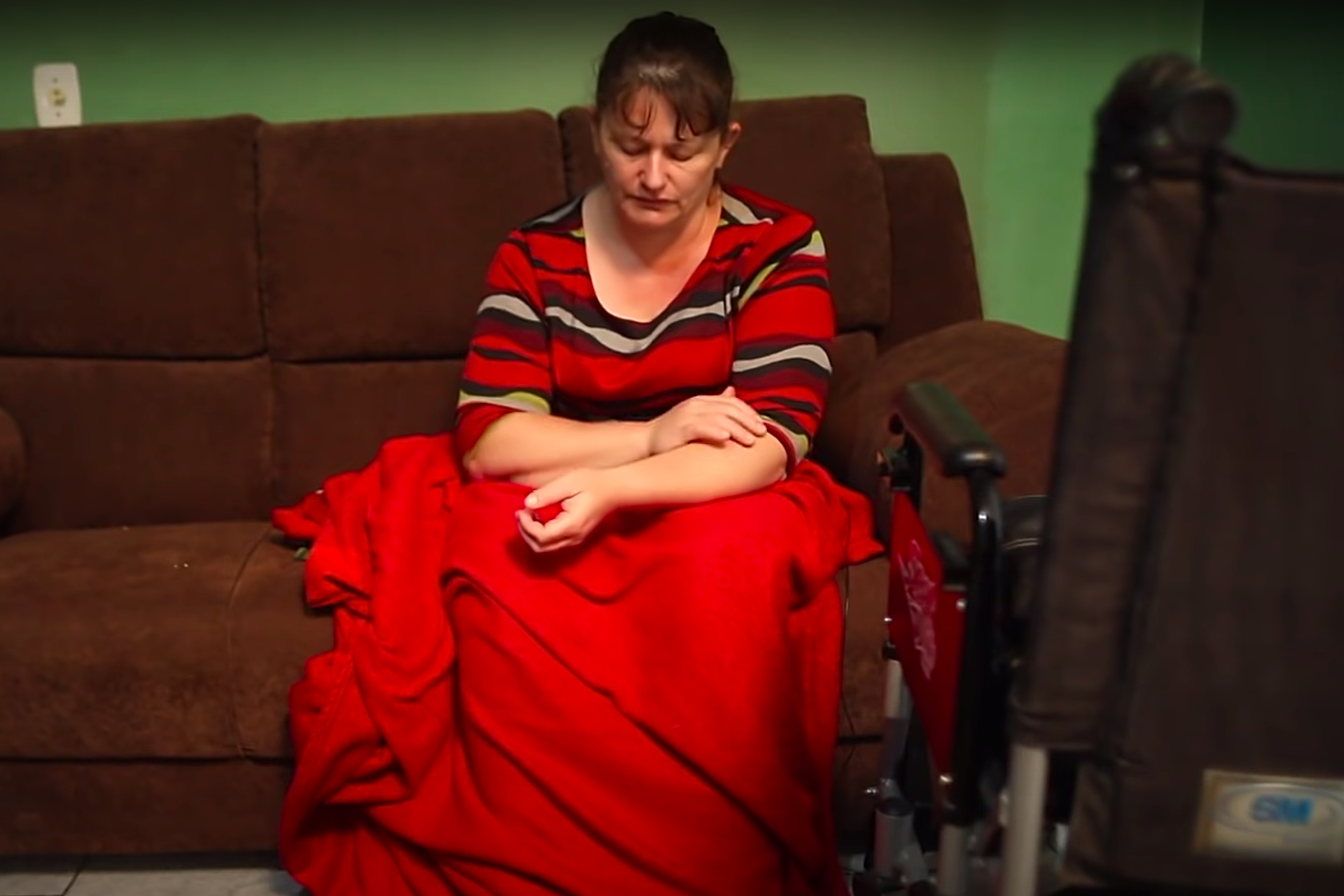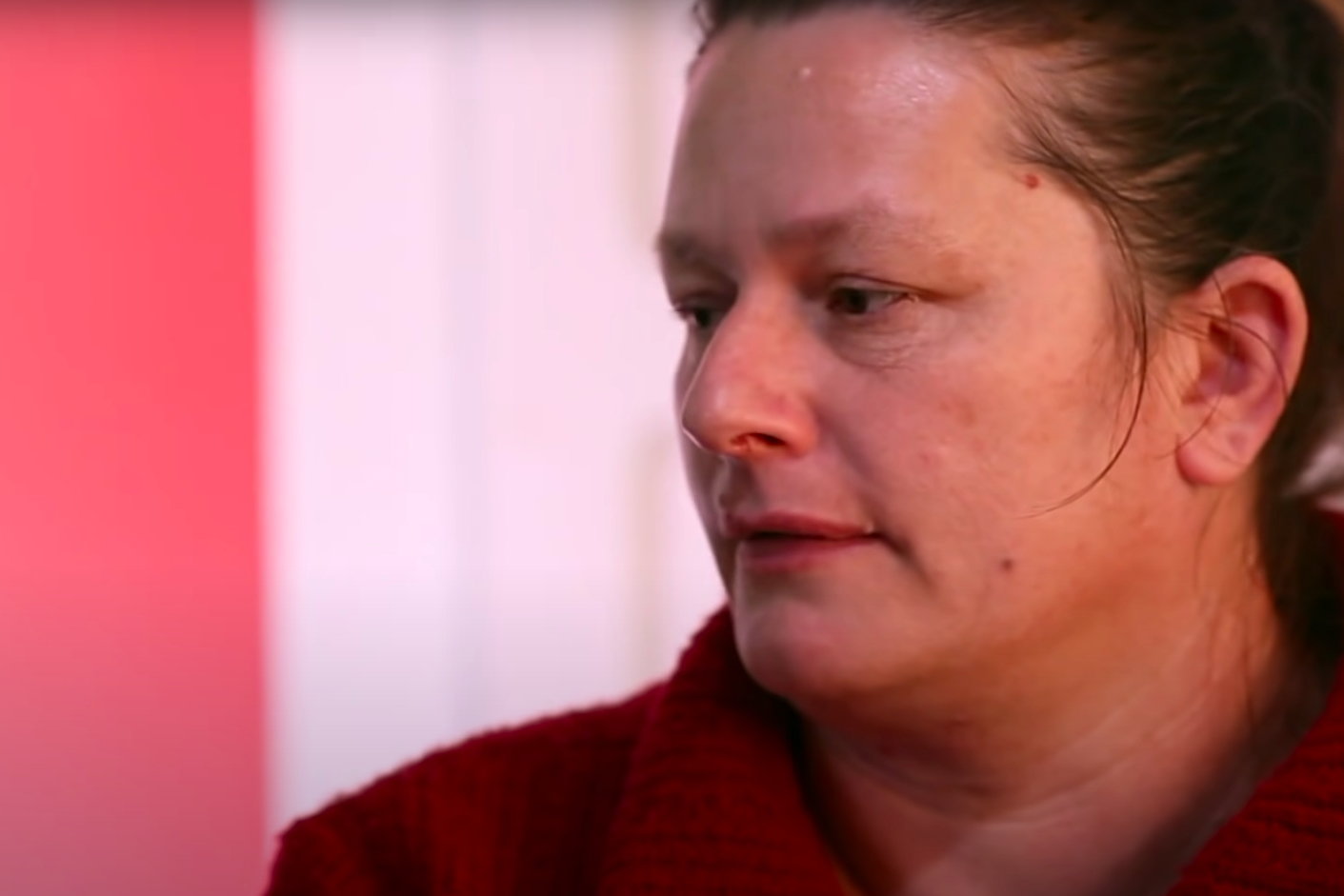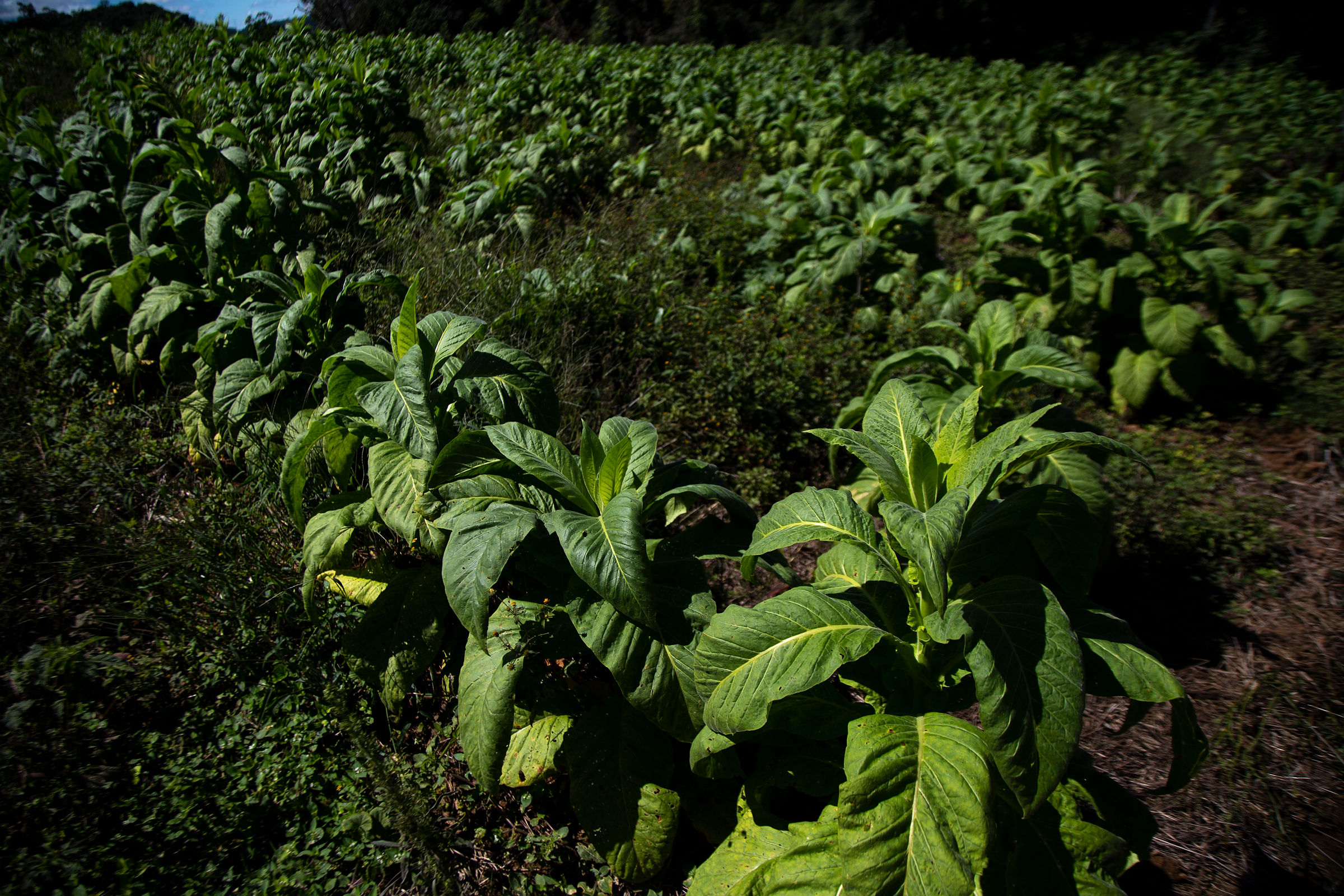
With a degenerative disease caused by pesticides, a former Brazilian tobacco farmer fights to hold Alliance One accountable for her illness
By Raquel Gurgel | 3 October, 2023

Former tobacco farmer Lídia do Prado in her house. Photo: Reproduction from documentary "The diagnosis", by Beto Novaes
Lídia Maria Bandacheski do Prado was a 40 year-old tobacco farmer in Brazil when she received a medical report stating that she could never return to work. In practice, she already knew this: for almost a decade, she had been away from the fields, incapacitated by the effects of chronic poisoning caused by exposure to pesticides.
In addition to unbearable body pain, Mrs. do Prado experiences tingling, weakness, and spasms, has lost the use of her legs, and suffers from depression. She has organophosphate-induced delayed polyneuropathy, a degenerative neurological disease with no cure. "I've just come out of five or six weeks of spasm episodes. Sometimes, neuropathic pain gives me a break, and then it comes back. It's not easy to live with," she says.
Mrs. do Prado’s health will never return to what it once was, but her case could be the first to result in legal accountability for the tobacco company that put her in this situation – Alliance One.
In 2015, as soon as Mrs. do Prado received a medical report indicating that she was permanently unable to work, she took legal action against the company in the Labor Court. The lawsuit is lengthy, and Alliance One has done everything to block it, appealing every decision. But so far, they have not succeeded.
The case was rendered a judgment by the trial court in favor of Lidia do Prado, recognizing the diagnosis of polyneuropathy, the causal link between the disease and her tobacco farming activities, and the employment relationship between the farmer and Alliance One. It was also determined that Alliance One is obliged to pay Mrs. do Prado a monthly amount – currently about US$ 1,200 – to cover the minimum necessary treatment to alleviate her symptoms.
The company filed an appeal, but the judgment was upheld in August by the Regional Appellate Labor Court.
Now, the company is likely to appeal to the Superior Courts, where the ministers will have the final say on the case. "If their appeal is denied, a deeper discussion about the relationship between farmers and tobacco companies will be opened," says Vânia Moreira dos Santos, Mrs. do Prado’s lawyer.
In this case, there will be a precedent for other farmers in a similar situation to seek justice: "It is essential for the ministers to be sensitive to this issue, and to be familiar with the case because this is not just Lídia's problem," she points out.
For Alliance One, the blame is on the victim
The relationship between Mrs. do Prado and Alliance One began when she was only 13 years old and lived with her mother. At that time, her family started working with Vera Fumos, which over the years merged with other companies, forming what is now Alliance One. After Mrs. do Prado got married, she continued to work with her husband for the same company.
Nearly all tobacco production in Brazil is done by family farmers in a model called Integrated Production System. Tobacco companies enter into purchase and sale contracts with farmers who have little or no autonomy in the production chain.

The companies determine the inputs to be used (like chemical fertilizers and pesticides); sell these inputs to farmers; provide technical assistance through advisors who visit the production from time to time; control the price they will pay for the tobacco leaves produced; and buy the production at the end of the season. Farmers are only required to comply with the requirements. "We couldn't use anything from outside, only what the company instructed, or else they wouldn't buy the production. They [the advisors] came without a scheduled time, took a sample, and if there was anything different, they wouldn't buy the tobacco leaves," Mrs. do Prado recalls.
According to Mrs. dos Santos, Alliance One rejected its own responsibility for Mrs. do Prado's illness, claiming that there was no employment relationship. However, the contracts gathered in the process prove that relationship was clear – and the court decisions so far align with this.
Furthermore, the company argued that Mrs. do Prado was solely to blame for her illness: "If the author did indeed develop an ailment due to the handling of agricultural pesticides, it was solely her fault because this would only have happened because she did not adopt the recommended practices," the company's lawyers wrote in 2016.
"But one of the most important points of the courts’ decision is the understanding that, once the company assumes the contract and provides the inputs, it has the obligation to comply with the technical standard for workplace protection and care," explains Mrs. dos Santos. After all, as Mrs. do Prado points out, she only followed the company's instructions: "We did everything correctly, we used all the pesticides as they said. And the annoying thing was that they didn't talk about any health risks. They simply provided a recipe: 'use this much of that, use this much of this.’ In all the time I worked for them, I never participated in a situation where they said pesticides could bring me health problems."
Alliance One also tried to refute all the medical reports presented by Mrs. do Prado, hiring an expert who claimed it was "unlikely that this condition [the disease] was caused by chronic pesticide poisoning."
Another claim by the company was that the case was already time-barred when the lawsuit was filed. "They said Lídia knew about the disease many years before filing the lawsuit," says Mrs. dos Santos.
In this regard, the court's decision was very important: the understanding was that the case was not time-barred since the lawsuit was filed as soon as a medical report was obtained indicating that the farmer was permanently unfit for work. This paves the way for other former tobacco farmers who are incapacitated for work: as soon as they get a medical report indicating that the condition is permanent, they can seek justice in the Labor Court to open a lawsuit like Mrs. do Prado's.
The struggle for a diagnosis
Mrs. do Prado began her journey in tobacco farming in the same way as many of her contemporaries' family members and neighbors – in childhood, helping her parents in the fields. She was born in Rio Azul, the municipality that produces the most tobacco in Paraná, Brazil. "I always say I was born from the cradle to the field, you know? We lived with our parents in the tobacco sheds; the children were taken to the fields as newborns. So, at a very young age, I started working, doing the tasks I could handle."
After her father died, the work became even more challenging for her, and at the age of nine, she had to drop out of school to "work like an adult," in her words. "When I was a teenager, I took on a lot of work. When it was time for spraying (pesticides), it was up to me. I felt sorry for my mother for carrying a heavy backpack pump. [I thought]: My mother has suffered so much, I'm younger, I can handle it. So, I would carry it on my back, spraying the area. When I got married, it didn't change much because we had a lot of tobacco plants, and I didn't want my husband to be alone. So, we shared the work."
Since childhood, she had symptoms of acute poisoning, such as nausea, headaches, diarrhea, and vomiting, but she never imagined that they could be caused by exposure to pesticides. In the early 2000s, symptoms became stronger and more frequent, and she also began to experience hallucinations, weakness, tingling in her body, and swollen lymph nodes in her neck and abdomen.
"I felt very weak and I would actually become paralyzed in the field. I was harvesting tobacco and suddenly I would yell for my husband: 'Come help me here because I can't move.' The paralysis got stronger and stronger, happening almost daily," recalls the farmer, who sought medical attention several times without finding an answer to her problem.
But one day, after decades of exposure, the problem became unbearable: Mrs. do Prado was almost finished applying pesticides to her tobacco crop when she became ill, fainted, and needed hospital care. It was 2007, and that was the last time she worked in a tobacco field.
Mrs. do Prado had to go through a true pilgrimage through public and private health services to get a diagnosis. In 2010, a medical report confirmed that she suffered from chronic poisoning due to environmental and occupational exposure to pesticides. Two years later, another report gave her disease its exact name – polyneuropathy.
The tip of the iceberg
The difficulties Mrs. do Prado faced in getting a diagnosis show that pesticide poisonings are often not identified in health services. "Lídia's case is emblematic because she had several episodes of acute pesticide poisoning, and health services never made a connection between her symptoms and the use of pesticides. There is indeed a difficulty because most symptoms are nonspecific, such as headaches, nausea, and vomiting. But if healthcare professionals had asked her what she worked with or what products she had been exposed to recently, they could have associated her symptoms with pesticide use. And, of course, they could have given her some advice" observes Marcelo Moreno, manager of the WHO FCTC Knowledge Hub for Articles 17 and 18 and researcher at the Center for Studies on Tobacco or Health (CETAB/Fiocruz).

Identifying chronic poisonings is even more complicated since they result from long-term exposure, not single events. "Once again, Lídia's case is symbolic because, despite this difficulty, she was able to get a diagnosis and managed to prove that her condition was related to her work," says Mr Moreno. In this sense, he emphasizes that the lawsuit serves as an example for other tobacco farmers who have become ill due to their work.
With the court decisions so far, Mrs. do Prado has secured financial resources for proper treatment. She takes medications to help with the pain, exercises, and has ongoing care with various specialists. But the truth is that she will never regain her health. Even with the best available treatment, Mrs. do Prado still experiences several episodes of intense pain and spasms, as well as anxiety and depression.
A decision by the Superior Courts upholding Alliance One's conviction is the least she can hope for in terms of justice. "I did everything just as the company instructed me to do and am paying with my own life for it. So, there comes a time when someone has to be held responsible for this," she concludes.
When contacted by us, Alliance One stated that "the company does not comment on ongoing legal proceedings."
The information and views set out on this story are those of the author(s) and do not necessarily reflect the opinion of the Parties to the WHO Framework Convention on Tobacco Control (WHO FCTC), the Parties to the Protocol to Eliminate Illicit Trade in Tobacco Products (the Protocol), or the Secretariat of the WHO FCTC and its Protocols.
